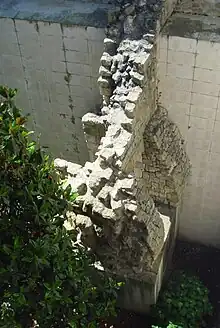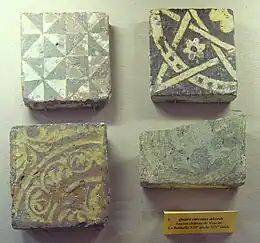.png.webp)


Vauclair Castle, also Vauclerc Castle (French: 'Château Vauclair) was a castle built in La Rochelle, on the Atlantic coast of France,[1] by Henry II of England in the 12th century.
The castle was located in the area defined by the current Place de Verdun (formally called Place du Château).[2]


It was incorporated in the fortifications of the city built by William X of Aquitaine, father of Queen Eleanor of Aquitaine, in 1130.
The castle consisted of four large towers connected by high walls. It was demolished at the request of Charles V of France between 1372 and 1375, after the Siege of La Rochelle (1224), and its stones were used to build a new fortification wall at Le Gabut.[3]
The name Vauclair comes from the Latin valde clarum (greatly light, luminous or white), as it was built in the white calcerous sandstone of the region.
Notes
- ↑ Béarn and the Pyrenees by Louisa Stuart Costello p.205
- ↑ Bradshaw's illustrated travellers' hand book in [afterw.] to France by George Bradshaw
- ↑ Base Mérimée: IA17000048, Ministère français de la Culture. (in French)